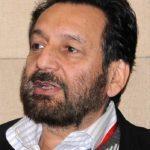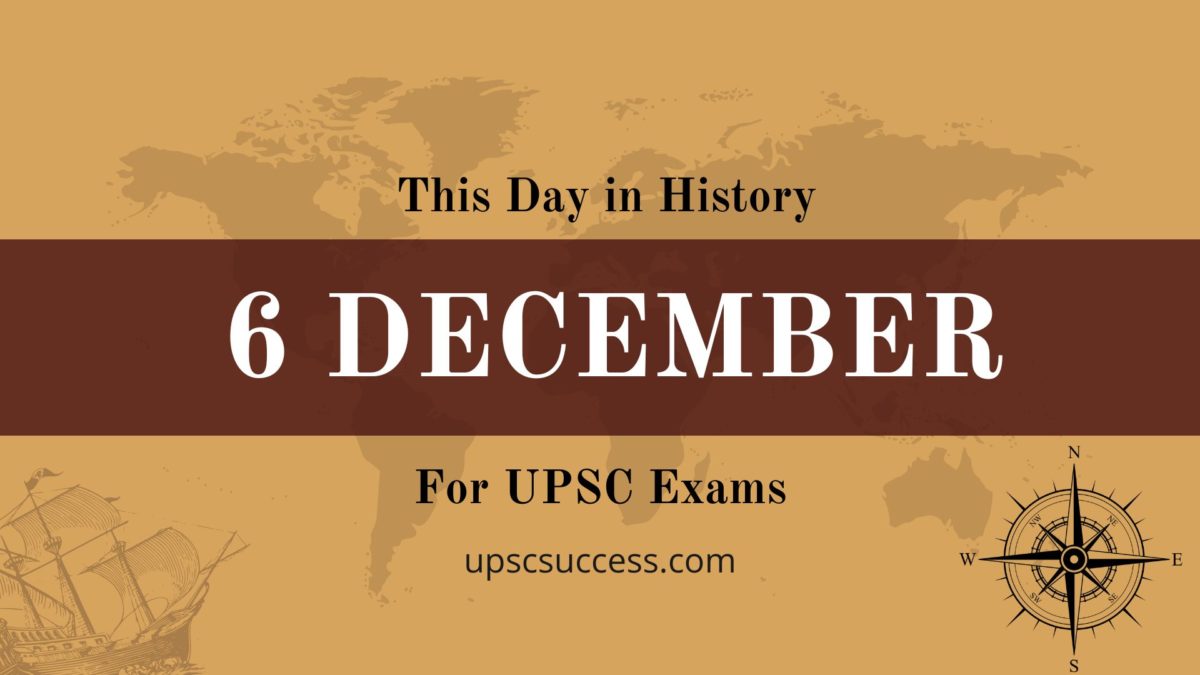Contents
This Day in History on 6 December
The historical events hold a lot of value for aspirants who are sitting for UPSC competitive exams including the IAS Exam.
On this page, we will list all historical events that occurred on 6 December. The students can refer to them while preparing for all competitive exams and banking exams.
Important Days
Important Events
1756: British troops under Robert Clive occupy Fulta India.
1768: The first issue of the Encyclopaedia Britannica was published.
1857: Raja Nahar Singh arrested by the Showers to kept him first in Motia Mahal and then at Metcalfe House, Delhi.
1897: London became the first city in the world to launch a licensed taxi cab.
1907: The first robbery incident related to India’s freedom struggle took place at Chingaripota railway station.
1907: Revolutionaries looted Chingaripota station.
1917: Finland declared independence from Russia’s hegemony.
1931: Bengal Congress to boycott British goods
1946: Establishment of the Home Guard Organization.
1946: Anglo-Indian talks end in failure after three days at London
1946: Homeguard Organination was established.
1952: First Indo-Soviet Trade agreement signed.
1962: India closes its consulates in Communist China.
1971: Pakistan severs diplomatic tied with India over India’s recognition of Bangladesh.
1971: US bars aid to India for aggression against Pakistan.
1978: Spain adopted the constitution.
1987: MiG-29, re-christened `Baaz’, inducted into the Indian Air Force.
1990: Iraqi President Saddam Hussein ordered the release of all hostages held hostage in Iraq and Kuwait as part of efforts to avert war.
1990: VHP-sponsored ‘karseva’ in Ayodhya passes off peacefully.
1992: The disputed Babri Masjid structure of Ayodhya was demolished. As a result, about 1500 people died in the violence.
1992: 300,000 Hindus destroy the mosque of Babri at Ayodhya, India. 4 die and BJP government in UP, led by Kalyan Singh, was dismissed and President’s rule promulgated. Then countrywide riots followed. Pakistan and Bangladesh condemned demolition.
1997: International Climate Conference began in Kyoto, Japan.
1997: Nine persons killed and over 60 injured in bomb blasts in three trains which left Chennai. Blasts occurred in Tiruchi, Erode (Tamil Nadu) and Trissur in Kerala.
1997: Space shuttle Columbia’s astronauts return to earth following a two-week science mission on an enquiry awaiting them because of botched satellite release. Columbia and its crew of six, including India-born Kalpana Chawla, swooped through a clear chilly sky and landed on runway at Kennedy Space Centre. Astronauts save runaway $10-million satellite by catching it with their hands.
1998: 13th Asian Games inaugurated at Bangkok.
2000: The great social activist Baba Amte was awarded the Dr. Babasaheb Ambedkar International Award by the Central Government.
2000: A. B. Vajpayee, Prime Minister, said, “The Ayodhya agitation was an ‘expression of nationalist feelings’ and the “task has remained unfinished”.
2000: The Supreme Court gives a clean chit to former Prime Minister P. V. Narasimha Rao upholding the trial court’s order, and discharging him and former Union Minister K.K. Tewary from the ‘St.Kitts forgery case’.


Birth/Birth Anniversary
1421: Henry VI, the King of England.
1732: Warren Hastings, Former Governor-General of India.
1823: Max Müller, a German-born philologist and Orientalist.

1853: Hara Prasad Shastri, an Indian academic, Sanskrit scholar, archivist, and historian of Bengali literature.
1892: Rukmini Laxmipathi, an Indian independence activist and politician.
1897: Lekhraj Kishanchand Mirchandani (Aziz), famous Sindhi poet, essay writer and critic, was born.
1932: Kamleshwar, Indian author, screenwriter, and critic (d. 2007)
1945: Shekhar Kapoor, an Indian film director, actor, and producer.


1950: Nirupama Rao, Indian diplomate.
1985: RP Singh, a former Indian cricketer.
1988: Ravindra Jadeja, an Indian international cricketer.
1993: Jasprit Bumrah, an Indian cricketer.
Death/ Death Anniversary
1799: Joseph Black, a Scottish physicist, and chemist.

1889: Jefferson Davis, an American politician who served as the president of the Confederate States.
1892: Werner von Siemens, a German electrical engineer, inventor, and industrialist.
1956: Dr. B. R. Ambedkar, an Indian jurist, economist, politician, and social reformer. He was the chairman of the drafting committee of the Indian constitution.
1976: Nana Patil, an Indian independence activist and politician.
1990: Tunku Abdul Rahman, Malaysia’s first prime minister.
1993: Samrendra Kundu, former foreign state minister and socialist of Orrisa, passed away.
1995: Prabhakar Barwe, a pioneer of Modern Indian painting.
1995: The Sixth Army Ordnance Corps Reunion and Silver Jubilee of Colour Presentation was celebrated at AOC Centre with pomp and splendour, fun and gaiety and professionalism of high order. The highlights included para-dropping, AOC Kangla Tongbi, Sonet-lumiere sound and light show, Central Parade and Yaadgar Parade.
2000: Bishop Vinod Peter, National Christian Council of India president and church of North India moderator, and Rajasthan CNI Bishop Gerald Andrews die in a car accident near Jodhpur in Rajasthan.
2014: Ralph H. Baer, a German-Jewish American inventor, game developer, and engineer.

